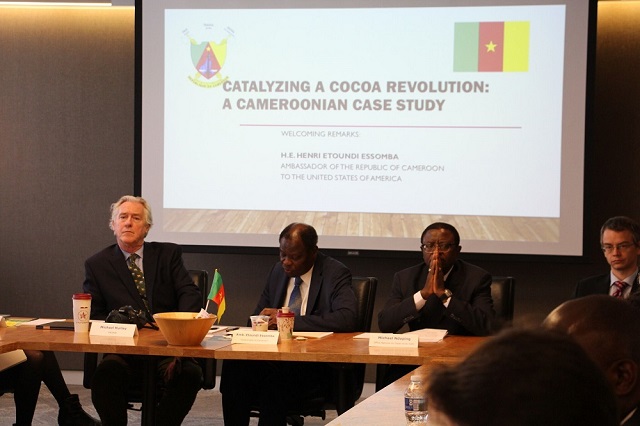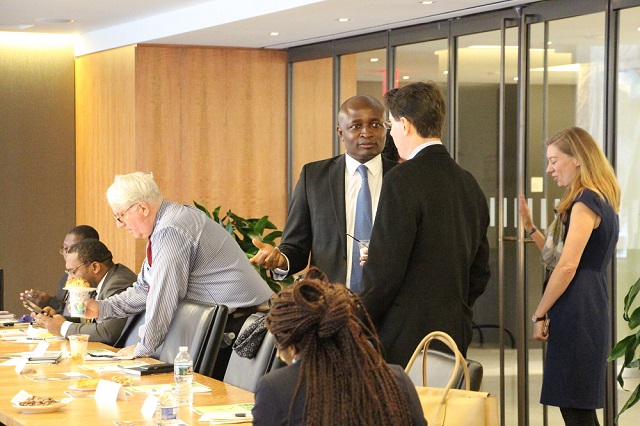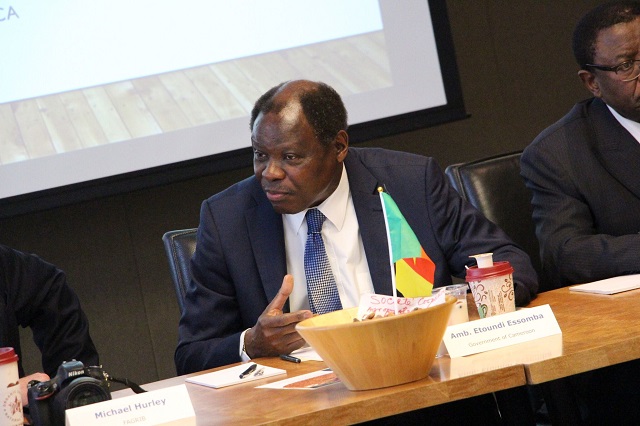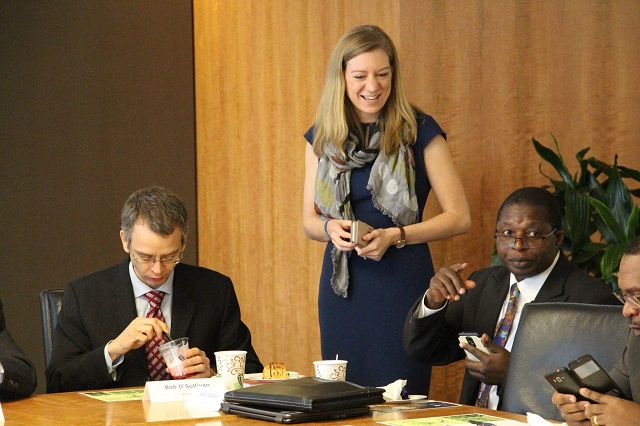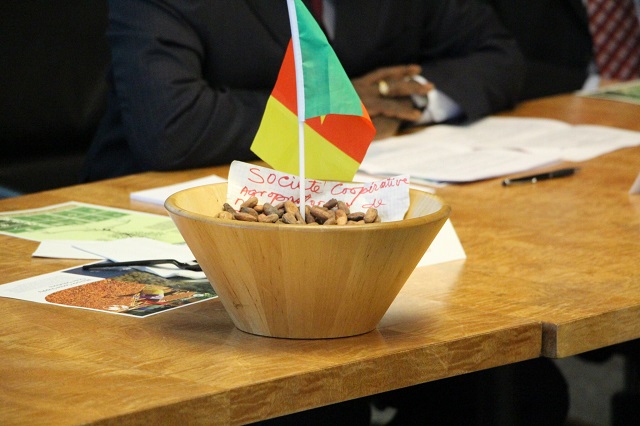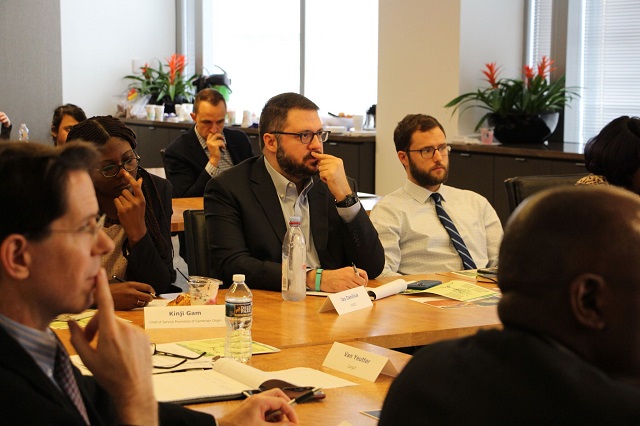
Upcoming Event :
AFRICAN TRADE & AGRIBUSINESS INTERNATIONAL CONGRESS
October 23 – 26, 2019, Maryland (USA)
Theme:
“AGRIBUSINESS AND TRADE SERVING AS KEY FACTOR FOR POVERTY ALLEVIATION AND GLOBAL FOOD SECURITY”
AGRIBUSINESS, THE ONLY HIGH PROFITABLY INVESTMENTS OPPORTUNITY IN AFRICA
Venue:
THE HOTEL, University of Maryland, College Park, MD USA
Contact:
Secretariat: +1 240 271 8324

Past Events
ICCAT2
May 14-17, 2019
THE HOTEL, University Of Maryland, College Park, MD, USA
INTERNATIONAL CONGRESS FOR AFRICAN AGRIBUSINESS AND TRADE
CONCEPT NOTE
Background
At its 50th anniversary, the African Union designated 2013 as the Year of Pan Africanism and an African renaissance within the framework of its ‘Agenda 2063-The Africa We Want.’ The initial ten year implementation plan (2014–2023) is guided by a shared strategic framework for inclusive growth and sustainable development focusing on an integrated prosperous and peaceful Africa, driven by its own citizens, representing a dynamic force in the international arena. Recognizing the crucial role agriculture plays throughout the continent, emphasis has been put on developing infrastructure. As one of the agencies of the African Union (AU), the New Partnership for African Development (NEPAD) has put together the Comprehensive African Agricultural Development Program (CAADP) as a means of addressing the crisis of African agriculture. This program focuses on investment into the following 3 mutually reinforcing pillars: (a) extending the area under sustainable land management and reliable water control systems; (b) improving rural infrastructure and trade-related capacities for improved market access; and (c) increasing food supply and reducing hunger.
Besides AU initiative via NEPAD, the United States (U.S.) has been a measure player in Africa’s agricultural development and agribusiness and trade. U.S. flagship initiatives include African Growth and Opportunity Act (AGOA) and Feed the Future. While Feed the Future guarantees food security and agricultural development, AGOA provides a pathway to economic growth through trading of Africa’s goods to the U.S. AGOA undoubtedly addresses some of the challenges faced by small holder farmers across Africa to access local, national, regional and international markets.
Agribusiness Market Access Challenge
Of all the market access capacity challenges, 2 of them are critical—limited competitiveness in the international marketplace and unprocessed produce with mostly static or falling prices. In response, CAADP offers a set of interventions for dealing with market access, such as emphasis on domestic or local markets as the building block for export markets. For this to be effective there is need for broad participation by smallholder farmers and women. In order to ensure robust economic growth, women, young adults, and other minorities need to be strongly encouraged to participate in any developmental programs. They must be included in the implementation of relevant policies including competition, tariff policy, financing, and market development. Market access also involves the ability of smallholders to access agricultural inputs and consumer goods. In fact, market access has become a key determining factor for food crops and export crop production systems.
Considering the importance of a market-oriented approach to agricultural development, African governments and their development partners, including the private sector, have an important role to play: (a) speeding up the rate of market development; (b) removing or reducing barriers to market access, both by special support in places where markets are slow to develop spontaneously and easing market participation of poorer producers; (c) establishing a more equitable set of market relations between producers and market intermediaries.
Furthermore, in 2012, NEPAD launched Boosting Intra African Trade (BIAT) to provide and ensure the attainment of the full benefits from the continental free trade areas and customs. The action areas for BIAT are trade, trade facilitation, production capacity, trade related infrastructure, trade finance, trade information and factor market integration. In spite of this initiative, intra African trade is growing very slowly at the rate of 15% compared to Europe (59%), Asia (51%), and North America (37%). This slow rate of growth is partially due to lack of access to trade and market information. Also, trade flourishes when countries produce what their trading partners have a demand for. With a few exceptions, this is not yet the case with Africa. It produces what it doesn’t consume and consumes what it doesn’t produce.
Concerning Africa trade with the rest of the world, the situation is somewhat different. For instance, U.S. trade relations with Africa are improving, especially with the enactment of the U.S African Growth Opportunities Act (AGOA). The US had $39 billion in total (two way) goods trade with Sub-Saharan African countries during 2017. Goods exports totaled $14.1 billion; goods imports totaled $24.9 billion. The U.S. goods and deficit with Sub-Saharan African countries was $10.8 billion in 2017.
ICAAT and Sustainable Development
Agribusiness and agricultural commodities policies are directly associated with several SDGs, including the following: SDG 1 (fighting extreme poverty), SDG 2 (achieving food security), SDG 9 (adding value to commodities), SDG 12 ( ensuring sustainable consumption and production patterns), SDG 14 (conserving and sustainably using the oceans, seas and marine resources for sustainable development), and SDG 15 (protecting, restoring and promoting sustainable use of terrestrial ecosystems, sustainably managing forests, combating desertification, halting and reversing land degradation, and halting biodiversity loss).
The implementation of the SDGs calls for a holistic and more integrated approach to agricultural development and agribusiness. It also calls for a rethink of the role of the public, private and civil society in addressing Africa’s pressing issues, particularly trade deficits with the rest of the world. While agribusiness is a promising dynamic for balancing the terms of trade between Africa and its U.S. partners, this sector is far from harnessing its full potential. It is against this backdrop that Futures Agribusiness (FAGRIB) has put forth the International Congress for African Agribusiness and Trade (ICAAT).
What is ICAAT All About?
The International Congress on African Agribusiness & Trade (ICAAT) is a first of its kind gathering of international private and public-sector leaders within the Africa agribusiness supply chain. This bi-annual gathering, which started in 2017 seeks to breach the gaps in knowledge, processes, and standards lacking in many agricultural industries on the African continent. It is also an opportunity to address global challenges-notably food insecurity, youth unemployment, poverty alleviation, gender inequality, land tenure rights, and sustainable economic growth.
ICAAT is the initiative of Futures Agribusiness (FAGRIB) LLC aimed at creating a platform for American businesses to interact with African agribusinesses, including large scale agro-industry and smallholder farmers or producer organizations. Also, the platform will facilitate the supply of African commodities to American manufacturers. In the same vein, American manufacturers will supply inputs to African agribusinesses. ICAAT 2019 targets 10 prime countries in Africa with high-growth potential.
Event will comprise African agribusiness and political leaders, bilateral and multilateral institutions, U.S. agribusinesses, investors, technical and policy experts, as well as representatives of civil society organizations. Participating countries will present their agricultural priorities, challenges and projects to investors and other relevant partners. Hopefully, partnership agreements will be signed after presentation and networking sessions.
What Does ICAAT Have To Offer?
ICAAT 2019 seeks to bring agricultural value chain actors spanning from production organizations, to policy makers, processors, marketers, and retailers. Other stakeholders in attendance include banks, financiers, investors, project owners, and project developers on the continent of Africa and the U.S., to discuss trends that will likely influence food and agribusiness for decades to come. The ICAAT platform is a game changer for Africa’s transformation agenda and the realization of Agenda 2030 on the continent. The following activities will take place:
- Assess and articulate farmers’ needs vis-à-vis agricultural value chains-production, processing, and marketing
- Bring together continental and global players to showcase and exhibit their goods and services, and to explore business and investment opportunities in Africa
- Serve as a marketplace for African agripreneurs and U.S. investors and partners to meet and explore business opportunities, including sharing of business and market information
- Create a platform for B2B exchanges and development of agribusiness opportunities taking into consideration demand and supply side needs and capacities
- Identify and bring to the fore social and environmental issues and not treat them as mere externalities to agribusiness. These include but are not limited to social inclusion and environmental sustainability.
What participants should expect
- Deal-making at the investment matchmaking sessions between agribusinesses and investors for prepared business plans. Note that only business plans received by the ICAAT team at least three months before event shall be eligible for matching. Ideally, ICAAT team must visit any potential business earmarked for matching
- To gain access to new markets, thus, increasing competitiveness, profitability and sustainability of African agribusinesses and their U.S. counterparts.
Who Should Attend!
- Senior government officials (agricultural, commerce, trade, etc.)
- Agribusiness players: producers, processors, marketing experts/retailers, investors
- Agricultural inputs suppliers: agro-chemical experts, machinery professionals, seed experts, and researchers.
- Co-op representatives, NGOs, multilateral and bilateral agencies.
Meeting at American Farm Bureau Federation
Washington D.C., September 29th, 2018. FAGRIB accompanied by Dr. Nganko, Vice President of the Cameroon Chamber of Commerce met with the representatives of the American Farm Bureau Federation (AFBF) to discuss opportunities of mutual interest. Dr. Nganko who oversees fishery section, at the Agriculture, Fishery, Animal Husbandry, and Forest (CAPEF) seeks to build business relationship in the U.S. The meeting was initiated by FAGRIB as part of its commitment to develop strategic partnerships that benefit developing countries.
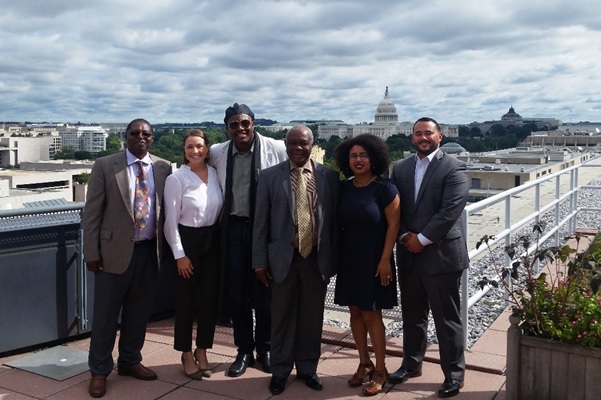
FAGRIB and Concordia
On March 7, 2018, Concordia, FAGRIB, and Winrock International, organized the Catalyzing a Cocoa Revolution Roundtable during Global Partnerships Week (GPW) 2018: The Cameroon Case Study was at the evidence.
The event brought together over 30 cross-sector leaders to address the role of partnerships in enhancing environmentally and socially responsible practices within the Cameroonian cocoa industry while also improving access to market for smallholder farmers.
The Cameroon Ambassador His Excellency Henri ETOUNDI ESSOMBA presented the opening remarks, and was head of the Cameroonian Governmental Delegation from the Ministry of Agriculture and Rural Development, the Ministry of Commerce, the National Cocoa and Coffee Board.
We were grateful to all participants for their attendance and for providing insight knowledge to build on current accomplishments on the ground by FAGRIB and the Government of Cameroon toward achieving measurable impact.

